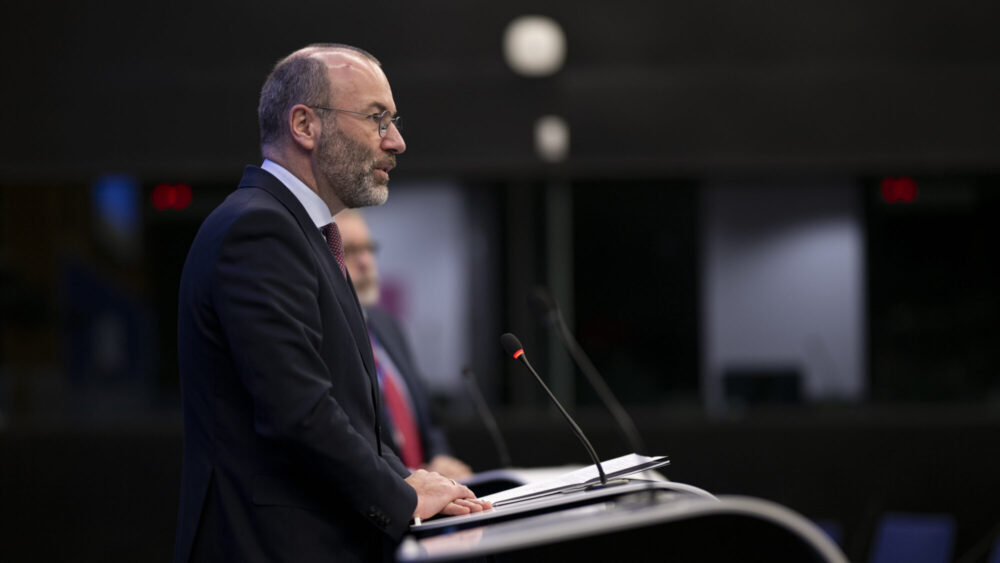
EPP President Manfred Weber in the European Parliament.
Photo: Denis LOMME © European Union 2024 – Source: EP
The EU needs to dramatically increase its defense capabilities and rethink its relationship with integrated defense structures to be ready for war, EPP president Manfred Weber said in an interview with Politico this week. Weber called for the establishment of a defense union to deter Russia because—you guessed it—Donald Trump won’t save us.
“When I look at this year as a European politician, the first thing that goes through our minds is Trump,” the EPP chief said, adding that the EU’s ability to protect itself without U.S. support is “the fundamental question” that will dominate discussions in Brussels in 2024.
Weber is not the first in recent days to use Trump to justify massive defense ambitions that would ultimately lead to the creation of an EU army under Brussels’ centralized leadership.
Earlier this month, Internal Market Commissioner Thierry Breton recalled Trump allegedly telling EU leaders in a private conversation that he would “quit NATO” if reelected, however ludicrous that might sound, given the U.S. armed forces’ interconnectedness with different NATO structures.
Nonetheless, the story helped Breton pitch a giant defense fund worth €100 billion that would be the basis of the future European defense union, set up through another round of joint debt, of course.
“We are in a historic moment and we must now understand and seize it,” Weber said during the phone interview while en route to Ukraine. The EU “must be able to defend itself independently,” he added.
Weber said his party—which is projected to lose a few seats but still remain the largest in the Parliament—is preparing to propose several concrete measures that would become the backbone of the defense union. The EPP leader pitched three things, in particular, to make up his “European pillar of defense”: a missile defense shield, a cyber defense system, and a nuclear umbrella.
“Europe must build deterrence,” Weber said. “We all know that when push comes to shove, the nuclear option is the really decisive one.”
The EU’s missile defense system—named “Eurodome” after the Israeli example—was already proposed by the European Commission back in October along with space-based infrastructure and Brussels’ very own war fleet with an aircraft carrier.
The idea of centralizing nuclear capabilities, however, is still a touchy subject and not thrown around easily. For the moment, the EU depends on the U.S. nuclear arsenal to deter Russia from using its own, with France being the only member state to have nuclear weapons, with around 300 warheads.
“We should take up [French President Emmanuel] Macron’s offer and think now about how France’s nuclear armament can also be embedded in European structures,” Weber suggested.
The “offer” was made back in 2020, when Macron proposed an EU-wide strategic dialogue on “the role of France’s nuclear deterrent in [Europe’s] collective security.” But not liking the idea of France taking a lead role in anything, Germany has been ignoring these calls for the past years, although the plan is still on the table.
Showing that Brussels is already preparing to ramp up the bloc’s joint defense policies, a recently leaked document suggests creating a standalone defense portfolio in the European Commission. The most likely candidate to become the EU’s first Defense Commissioner is rumored to be Polish Foreign Minister Radosław Sikorski.
However, these issues are not going to be discussed overnight, but there’s something that must be done immediately, Weber asserted, which is switching to a “war economy” to help Ukraine and boost readiness in the long term.
Despite Brussels promising to deliver one million artillery shells by March this year, less than half of that has made it to Ukraine so far, and Kyiv is being forced to ration ammunition, Weber noted. He thinks EU member states should use emergency decrees to force their defense companies to pivot production to Ukraine instead of exports and profit.
Furthermore, Weber suggested that EU decision-making should be simplified to make it more effective, implicitly arguing for scrapping veto powers in the Council. Since the €50 billion Ukraine package is only delayed because of the veto of one member state (Hungary), the only way to hasten this and other procedures is simply to not let everyone have a say in it.
“We are suffocating in our own bureaucratic rules and are much too slow to support Ukraine. And that’s why we also have to switch to a kind of war economy in procurement for Ukraine where Europe decides quickly, where the ministers decide quickly,” Weber said.
The argument is nothing surprising coming from Weber, as the head of EPP is one of the main EU leaders who have been calling for Eurofederalist treaty revisions for a long time, including stripping member states of veto rights and increasing the powers of the European Parliament.
Anticipating the next round of enlargement within the decade, there is more and more talk about treaty change to “accommodate” the newcomers, with the European Commission expected to unveil the first concrete proposals sometime next month.
